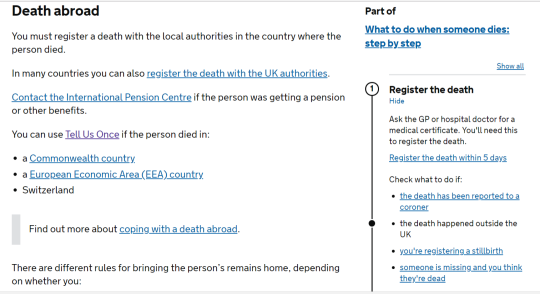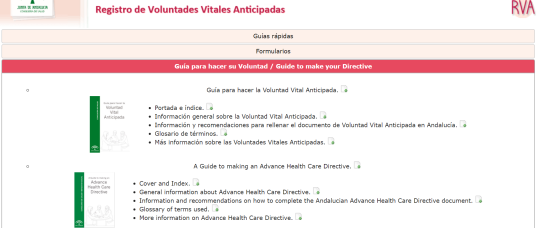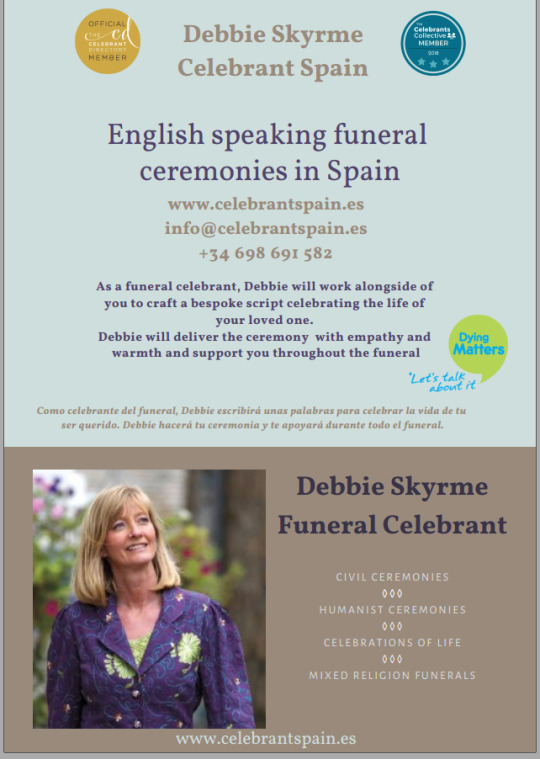Death process in Spain – what to do when someone dies
All you need to know about dying abroad in Spain, death registration of an expat resident in Spain, the funeral process and celebrations of life.

Funerals happen very fast in Spain.
I remember speaking to a British person who sold funeral insurance here in Spain. A family member had died and within 48 hours the agent’s immediate family (the extended family never made it ) found themselves sitting in a cold crematorium building, with a Spanish Catholic minister delivering a eulogy in a language the agent couldn’t understand, about the agent’s loved one whom the minister knew nothing about, at a religious ceremony they did not believe in.
And this was a funeral industry professional who thought they were prepared.
The above story is not unusual. Funerals happen very fast in Spain. It is the law.
The following quote is taken from the British Consul Spain, Bereavement Pack (link below)
“
Preservation of your loved one is expensive
In the UK, storage and embalming of a deceased person is paid for by the state. Funerals happen often two or three weeks after the person has passed away, giving the family time to gather and prepare.
This is not the case in Spain where storage of the deceased person is at the expense of the family. Most funeral plans and funeral insurances include storage of at least 24 hours, usually 48 hours (check your policy). If you do not have a policy or go beyond the time limit you will have to pay a daily rate for preservation of your loved one in a temperature controlled storage facility… and it is not cheap! Not only that, but after a specified time, the body must be embalmed.
Coffins are compulsory
Another notable difference between the UK and Spain is that coffins are compulsory, even if the deceased is to be cremated they must be in a coffin.
And no, coffins are not recycled, the coffin is cremated as well!
Your choice of coffins is also currently limited in Spain in that eco-friendly options such as willow caskets are not widely available, if at all in some areas.
Most “burials” are above ground in a niche. You can buy a family niche in perpetuity but it is very common in Spain to rent the niche for a period of about ten years, after that time your loved ones remains are moved to a common grave. Check with your funeral director what is included in your policy.
48 hours may be too soon
As a Civil Celebrant I, or one of my funeral celebrant colleagues can work with you to craft a suitable funeral service or Celebration of Life ceremony within that short time frame from death to burial or cremation.
We have supported bereaved families by writing some very meaningful and beautiful ceremonies with very little preparation. You must TELL YOUR FUNERAL DIRECTOR if this is what you wish to do, otherwise a local Spanish minister may be allocated to you.
Understandably however, you may feel that 48 hours is too soon to prepare a funeral service or celebration of life ceremony and indeed for family and friends to get over to Spain to pay their final respects.
In this instance my advice is to agree for your loved one to be cremated within the free storage time period offered to you by your funeral director, and keep the ashes until everyone is ready to say their goodbyes.
Celebration of Life
You may decide that you prefer a secular, humanist or civil ceremony (they are all very similar). In which case TELL YOUR FUNERAL DIRECTOR.
They should have allocated a portion of your funeral plan fund towards a minister, but that money can go towards a priest of a different religion if available, or a civil celebrant. Note that not all plans include payment for a minister and you may have to contribute extra to cover any shortfall.
In my particular case, I will attend the crematorium 1) out of respect for your loved one and 2) to register with the funeral director as the paid minister (otherwise you lose any payment allocation). At a later date, when you are ready, I will perform the Celebration of Life ceremony to scatter the ashes at the location of your choice.
Be Ready – have THAT conversation
In my opinion, the best solution by far is to think about your death whilst you are still fit and well.
Be Ready. Have the conversation. Write down your wishes. Write a will. Register an Advanced Medical Care Directive. And if you would like to, give me a call and we can sit down together and draft your funeral script together – with your most loved readings, favourite songs and you can even leave a final gift to your loved ones of special messages to them in your own words.
Read my earlier blog for full details
“Let’s Talk Funerals. Having THAT conversation”


Death registration
With regard to death registration, whether you are on holiday in Spain or you are resident in Spain it must always happen in the country where the person died – so if you die in Spain, your death must be registered in Spain.
Note that you can additionally register a death with the British Registration Service at a cost of £150. They also offer a “Tell Us Once” service to cancel passports, government pensions and driving licences with one notification
https://www.gov.uk/after-a-death/organisations-you-need-to-contact-and-tell-us-once
Death whilst on holiday in Spain
If you die whilst on holiday in Spain your travel insurance company should be contacted for advice on repatriation. Your consulate can also advise.
Click for free download: The British Consul Bereavement Information for Spain
Death of an expatriate with Spanish residency
If you live permanently in Spain and have what is known as “residencia” you should consider a funeral plan with
– a funeral director (usually cheaper but limits you to that specific funeral director)
– an insurance company (usually more expensive but operates within a wider radius should you move house)
Many people prefer not to have a funeral plan. They think that to contact a funeral director directly at the time of need is the best, but remember it can be a very distressing time and the cost may actually be more expensive than buying a plan as in a case of supply and demand.
You can go to the Gov.UK web site for information regarding What To Do After Someone Dies Abroad:
https://www.gov.uk/after-a-death/death-abroad


Advance life care options and organ donation
You can write a “living will” in Spain to record your wishes regarding advance life-care and organ donation. The document is available from the Junta de Andalucia and is called the REGISTRO DE VOLUNTADES VITALES ANTICIPADAS (VVA) it is accessible from your medical records.
Go to the Guide to Make Your Directive and click on the Advance Health Care picture to download a free PDF guide in English.
Note that the actual VVA form is in Spanish and must be completed in Spanish.
General advice is to take advice from your doctor and discuss your wishes with your loved ones before completing your Advanced Health Care Directive and nominating your representative.
Note that your nominated representative is responsible for making decisions for your advanced health care when you cannot and if they are not a family member, their decision will override any wishes from family.
You can complete the majority of your Directive online however the final step requires an appointment with the Andalucian Registry of Health Care Directives for you to finalise the process.


Author of this blog: Debbie Skyrme is a former UK Deputy Superintendent Registrar and Deputy Registrar of Births, Deaths and Marriages who offers English speaking civil ceremonies in southern Spain
www.celebrantspain.es
info@celebrantspain.es
tlf: 698691582
Facebook: CelebrantSpain
Instagram: CelebrantSpain



